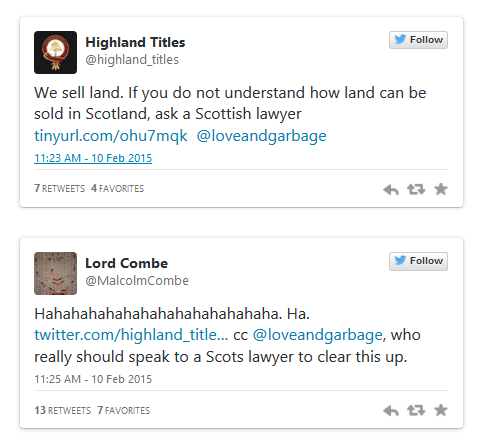It’s one of the best examples of the Scottish legal profession (and indeed other lawyers from around the world) using social media to come together to clarify a point of law and shine light on misleading marketing.
What happened? “If you do not understand how land can be sold in Scotland, ask a Scottish lawyer”
Guernsey-based Highland Titles Ltd have been offering small plots of land in Scotland as souvenir purchases, claiming that those who purchase such a plot from them will become “owners” of those plots of land (and can therefore style themselves ‘Lord/Lady of Glencoe’ (from just £29.99)). This had gone under the radar of many, at least on Twitter (note comments below re 2012 debate), until 10 February 2015, when things blew up following a promoted tweet that landed on Scots academic lawyer and social media enthusiast Malcolm Combe’s Twitter timeline. Here’s the promoted tweet (initially published Dec 2014):-
Buy land in Scotland & you may style yourself as Lord or Lady of Glencoe! From £29.99. Visit your plot using our app https://t.co/nUaXGQhUXf
— Highland Titles (@highland_titles) December 5, 2014
This has obviously been on Malcolm’s radar for some time. See e.g. this tweet from 2013 to @loveandgarbage:-
@loveandgarbage maybe he kept a souvenir plot? Ownership to such transfers without registration, according to Highland Titles. :o) — Malcolm Combe (@MalcolmCombe) April 19, 2013
After replying to the promoted tweet, this time, however, Malcolm, @loveandgarbage (himself a Scots lawyer) and indeed the entire Scottish legal profession on Twitter were provoked into entering the debate through this tweet from Highland Titles:-
What does Scots Law actually say?
The issue, which was about to be clarified through social media channels in an unprecedented way, is twofold:-
1. What does it take to own land in Scotland? Under Scots property law, you must be registered as the owner of the land to become the owner with a real right to the property.
2. Can you call yourself Laird or Lord or Lady after purchasing a souvenir plot? In Scotland, subject to the requirements of good faith, you can call yourself whatever you want. But simply calling yourself “Lord”or “Laird” does not make you a Lord.
For more on the actual legal position, see the background publications from 2012 already covering this in the undernote below (in addition to the links throughout this post).
The Issues Erupt on Social Media
@MalcolmCombe then published a comprehensive Storify detailing the full account of what happened on Twitter. See:- “Buy land in Scotland… style yourself as Lord or Lady of Glencoe! Or something: A short Storify about Scots property law” here and blog post here (amassing 10,000+ hits within a few days).
The one where @Highland_Titles tells Scots lawyer @loveandgarbage he should get some advice from a Scots lawyer https://t.co/TvF6X4IZIE — anya (@anyabike) February 10, 2015
This was soon followed by other experts mainly through Twitter itself (despite Highland Titles accelerating the debate by calling them Twitter trolls (note post unpublished but available via Google’s cached version here). And also through detailed legal blog posts:-
@NearlyLegal‘s blog “On the naughty step: The Low Road edition” here
@LoveandGarbage‘s blog “I can’t believe it’s not ownership – or the curious tale of Highland Titles selling” here [and as at 15 Feb 2015 a new one – More on Highland Titles – can you be a laird?” here
@AndyWightman‘s blog Who owns Lord Glencoe’s plot? here
Twitter Debate Sparks Souvenir Plot Memes
And a few days on, the debate led to souvenir plot memes, with @HighlandLawyer asking people if they’d like to become a ‘Warlord of Atlantis’ for only £29.99.
Be a “Warlord of Atlantis” for only £29.99! https://t.co/UfXhcaf1Yw @loveandgarbage @MalcolmCombe
— A Lawyer (@HighlandLawyer) February 14, 2015
and Boromir having his say
@HighlandLawyer @SaschaNoPants @loveandgarbage pic.twitter.com/OOs6JUVac3 — Steaphanaidh Carlyle (@steaphanaidh) February 14, 2015
and even a new Twitter account springing up called ‘Jedi Titles’ @jedi_title
For just 29 space pounds and 99 space pence YOU could be a genuine Sith Lord. ‘Apply’ today!
— Jedi Titles (@Jedi_Title) February 10, 2015
Bounce the dog even made an appearance
“… And then Highland Titles asked me for legal advice on property law…” (.@loveandgarbage .@MalcolmCombe) pic.twitter.com/yMpenb5DA7 — Malcolm Harvey (@MalcH) February 13, 2015
and ultimately with people realising that this may have gone a bit too far
Become a Warlord of Atlantis! http://t.co/QbUDSkG8lF @HighlandLawyer adds another pounding of @highland_titles. pic.twitter.com/zYisJaY4rL
— Lord Combe (@MalcolmCombe) February 14, 2015
Comment: Fueling the Social Media Firestorm
Which leads us to look back and add some extra comment and analysis to the debate:-
1. As noted below, there have been various publications on the subject of the legal position on souvenir plot sales in Scotland dating back to at least 2012. So how was this different? Could Highland Titles have gotten away from this without the social media backlash? Probably. It doesn’t take Captain Hindsight to work out that you shouldn’t tell academic and practising solicitors on Twitter that they are wrong about something that they aren’t actually wrong about. And you shouldn’t then call them Twitter trolls for their opinions in response. This clearly added a great deal of fuel to the social media firestorm.
2. The legal profession in Scotland is very closely-knit so it’s not too surprising others joined in on social media channels to voice the correct legal position. Social media use in the legal profession in 2015 is also more advanced than it was back in 2012.
3. The digital marketing team at Highland Titles is to be commended for their efforts around this (other than, of course, whoever sent the initial tweets to Malcolm and whoever published the Twitter Trolls article). With their online reputation management skills, they set up highlandtitlesscam.com and optimised it so that anyone searching online for ‘Highland Titles Scam’ would find their side and their version of their brand story above others, and this is despite some legal tweeters’ attempts (such as Malcolm’s) to create similarly optimised pages targeting the same terms to tell a more legally accurate story. They have also done a commendable job in the technical sense with their website and promotional campaigns on Google Adwords, Twitter and other channels. This comment doesn’t mean, though, that the messages being promoted aren’t at times still flawed or misleading.
4. Highland Titles have already been censured by ASA (the Advertising Standards Authority, the UK’s independent regulator of advertising across all media) for giving a misleading impression of their services on their website. Here’s what was upheld by ASA back in 2014:-
“We considered the overall impression of the website and noted a large number of statements that implied a direct link between the purchase of the land sold by Highland Titles and the attainment of the titles Lord, Lady or Laird, including “Buy a plot of land in Scotland and become a Laird”, “We are simply acknowledging your right to use the title of Laird, Lord or Lady as a Scottish landowner” and “So the easiest way to become a Lord or Lady is to buy a large estate (at least a square foot) from Highland Titles and become a Laird!”. We considered that consumers were likely to understand those statements to mean that through the purchase of a souvenir plot of land from Highland Titles they would gain the right to use a title to which they would not otherwise have had the right. We considered that those statements contradicted the message that anyone was able to use those titles and gave the impression that the titles available to customers who bought land from Highland Titles were recognised in a way that titles adopted by ordinary members of the public were not. Because we considered that the ad included a number of contradictory statements in relation to the nature of the titles available to Highland Titles’ customers, we concluded that the website was ambiguous and likely to mislead. On this point, the ad breached the CAP Code (Edition 12) rules 3.1(Misleading advertising) and 3.11 (Exaggeration).”
It’s amazing therefore that they continued to tread a fine line through the recent statements they were making on social media channels.
4. The social media noise and engagement around this subject probably won’t affect Highland Titles’ business too much. The business will still appear highly in Google either through their Adwords campaign, or through promoted tweets or other promoted social media posts (eg Facebook) or through their targeting of ‘scam’-type searches. And in any case the consumers of their services (who have probably spent overall in the millions of pounds for plots of land) will still continue to buy. Their purchases are most likely of sentimental or commemorative value. Even the 1979 Act defines ‘souvenir plot’ as “a piece of land which, being of inconsiderable size or no practical utility, is unlikely to be wanted in isolation except for the sake of mere ownership or for sentimental reasons or commemorative purposes”. And if the purchasers really were relying on a real right to the property, some of them at least would have taken legal advice by now and discovered they hadn’t received that real right, but instead only a personal one. Would they care for the sake of £30? Probably not. This tweet from @AllyMacabre sums it up nicely:-
@andywightman @TheScotsman Anyone paying £30 to endorse the class system and buy a crumb is pretty shallow, and probably deserves ripped off
— Alasdair Maciver (@AllyMacabre) February 14, 2015
5. Ultimately one of the main lessons from all of this is that on Twitter you shouldn’t tell a Scottish lawyer he should speak to an actual Scottish lawyer to get a correct legal opinion about something that isn’t actually legally correct.
PS shouldn’t there now be a reflective hashtag for this? Like #titlegate?
Undernote: Further background on the subject of souvenir plot ownership in Scotland from publications dating back to 2012:-
Registers of Scotland – Souvenir plots (also here Caution the souvenir hunters: The Journal Online (2012))
“A souvenir plot is defined in the Land Registration (Scotland) Act 1979 as “a piece of land which, being of inconsiderable size or no practical utility, is unlikely to be wanted in isolation except for the sake of mere ownership or for sentimental reasons or commemorative purposes”.
The Keeper is required to reject an application for registration in the Land Register, if the land to which it relates meets the description of “souvenir plot”.”
Halliday Campbell WS: Who “owns” a souvenir plot? (2014)
“Some would have you believe that Scots law allows anyone to be the Laird of, if not all he surveys, at least a square foot. And entering the realms of aristocracy is said to be astonishingly cheap. One site advertises souvenir plots “from just £29.99” and claims that, in return, you can “obtain a title that was previously available only to Scottish landed gentry” and use a clan crest, coat-of-arms and tartan. By “Scottish tradition”, it’s claimed, ownership of the plot “legally allows” you, or someone you love, to use the courtesy title of Laird, Lord or Lady and many people will apparently “update their driving licence, credit cards and such like” to reflect their new status. I’d pause here to note that the law of Scotland legally allows you to use the courtesy title “Messiah”, and to update accordingly as much paperwork as you like, for nothing.”
“The important thing to bear in mind is the difference in Scotland between a real and a personal right. It is the real right that people recognise as ownership and Scots law has always required delivery of the thing bought to create that real right. To use the posited example, if I “buy” your kettle, I don’t “own” it until you give me possession of it. If you keep it and sell it to someone else, I can sue you but the sale is still effective. You have retained the real right of ownership and can pass it on to someone else. Of course, you can’t deliver land.”
“So, the argument that says you don’t need to register title to a souvenir plot is at best disingenuous. It’s not that you don’t need to: you just can’t. So, you can’t “own” the plot and someone who subsequently buys the entire estate may register their title and leave you with only a personal right against those who sold to you.”
And can you call yourself Lord?
“Some people appear happy to part with money to “buy” a star. And of course the buyer of a little piece of the Highlands gets to call themselves “Laird”, which must be the same kind of thing as “Lord”. Right?
Well, not quite. Like Screaming Lord Sutch, in Scotland anyone can, subject to requirements of good faith, call themselves whatever they like, including “Laird”,“Lord” or “Lady”. There’s no need in Scots common law for a deed poll, statutory declaration or the like. However, just as adopting the moniker “Duke of Earl” wouldn’t make you either, let alone both, simply calling yourself “Lord”or “Laird” does not make you a Lord. You cannot render yourself a peer simply by changing your name and you won’t acquire a right, say, to use heraldic devices like coats of arms. This is something which Scots law still takes very seriously and the use of unauthorised Arms is a criminal offence…
“And “member of a clan” includes anyone with the clan surname or who simply “offers allegiance to the chief”. So, basically, anyone…Like an Englishman, a Scot’s home may be his castle but it’s never going to provide a short cut to nobility.”
Souvenirs of Scotland, Dr Douglas Bain (Teaching Fellow, The University of Aberdeen School of Law) & Catherine Bury (Solicitor, Ledingham Chalmers)
“But, while the Sasine Register is more tolerant of souvenir plots, the Land Register abhors them. As a real right is dependent upon registration, the best the aspirant laird can expect for his £29.99 is a personal right against the seller.”
“The issue of those persons offering the sale of souvenir plots in the face of the Keeper’s refusal to deal with them are misleading potential purchasers and this is, it is submitted, an issue of consumer protection rather than conveyancing.”
Highland Titles Scam And Other Bevis Family Schemes And Scams: Highland Titles Scam – Souvenir Land Plot Ownership In Scotland (2012)
“These small souvenir plots cannot be registered in the Scottish Land Registry. Inability to register a souvenir plot means that the purchaser can only get a personal right of ownership. He or she cannot get a real right protected by the state guarantee that underpins a registered title. There is no true purchase involved as no title can be obtained to the plot of land…
If you bought a souvenir plot of land in Scotland and was led to believe you were buying the real right of ownership of that land by the seller, you’ve been conned, ask for your money back.”
Registers of Scotland | Fake Scots Titles
“there is nothing to stop an unscrupulous vendor of such plots (who has already used misleading advertising to market them) from re-selling the whole estate to a third party who has absolutely no obligation to the the owners of Souvenir plots”
Registers of Scotland issue guidance over ‘Souvenir’ plots of land (Inksters Solicitors, 2012)
“Whilst the companies selling these plots may spin this statutory provision in such a way that the unwary buyer thinks that registration of souvenir plots is not required, the Keeper of the Registers of Scotland is clear – ownership of land only has legal effect on Registration. No registration means no real ownership, despite some websites stating that the right of ownership is transferred by the law of contract.
If the land that has been supposedly bought is not actually yours, what about that grand title? Again, the claims made by these companies are not entirely accurate. An individual is only known as a Laird if they own a considerable area of rural land, arguably at least hundreds of acres, and it is not an official title but merely a customary one given to that person. It is a label that is falling out of use anyway.”
“As with any potential purchase involving land, a Solicitor should always be consulted who can properly ensure that the buyer is aware of all the facts before going ahead.“

